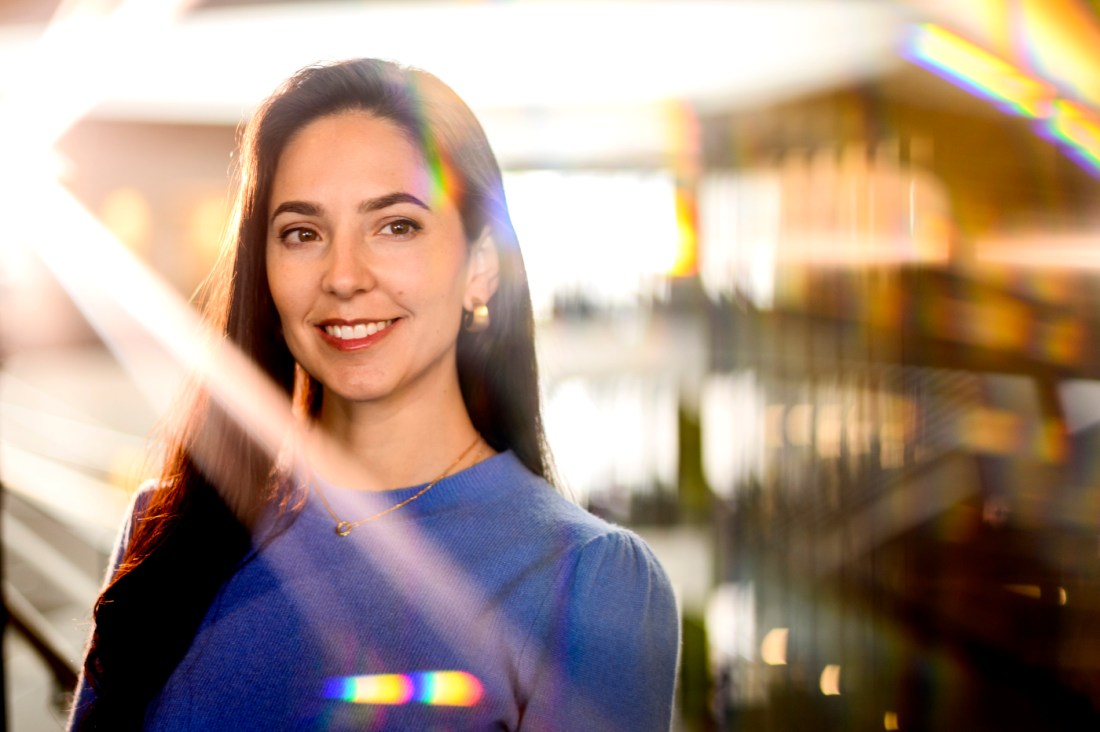Alexandra Rodman was thinking outside the box when she applied for a Templeton Foundation Character Virtue Grant.
The John Templeton Foundation writes that its mission statement is “to support interdisciplinary research and catalyze conversations that inspire awe and wonder.”
Rodman, an assistant professor of psychology at Northeastern University, says that this kind of mission orientation means that most of those who apply to grants through the foundation — at least in her field — “tend to be more social psychologists.”
But Rodman is a clinical psychologist who relies on experimental data for her findings, so the Templeton Foundation didn’t seem, at first, like a natural fit.

But then she came across the foundation’s Character Virtue Development program, which offered “funding [to] interdisciplinary and multidisciplinary teams that seek to further our understanding of the nature and development of virtues.”
In her research, Rodman studies social media’s effects on adolescents as they mature, and especially how they respond in stressful circumstances. In the Character Virtue Development program, Rodman identified an overlap: an interest in the overall well-being of adolescents.
“I had to do a little research to understand, what exactly do they mean by ‘virtues,’” Rodman says. Some of the qualities the Templeton Foundation is interested in include “gratitude, optimism, compassion maybe, curiosity even,” Rodman says, and especially how these qualities first appear and propagate (or fail to) in youth.
These are virtues that the foundation sees as being “for the betterment of society,” she says, “the social fabric of society.”
“Something that we are interested in is tracking,” she continues, “what I call the embodiment of virtues over time.”
“In my lab, we study the social lives of teens, and we take, particularly, a social lens to understanding teen well-being and teen risk for mental health [issues]. And this social lens can come in the form of understanding teen behavior, teen experiences.”
Using tools like MRI — “to understand brain activation, especially in the context of development and age-related differences,” Rodman says — and “digital phenotyping, which is a fancy word for tracking smartphone use,” she continues, her team would track how social media — and digital life more generally — impacts adolescents.
When the Templeton Foundation announced its Character Virtue Development program, Rodman saw “an opportunity to make a match,” she says, “that otherwise would not have been on my radar.”
Now her lab will also examine how “the embodiment of these virtues — like gratitude or optimism in the face of stress — how does that affect [teens] or modulate their outcome? How are they more resilient, in a way, to stress?”
“Because our study is longitudinal,” she continues, and thanks to previous funding from the National Institute of Mental Health, “we have this infrastructure and recruitment pipeline, and all of these things that allow us to fold” the Templeton grant “and related questions into our ongoing study.”
This pre-existing infrastructure “makes it more feasible in a way. That’s why Templeton was also excited,” Rodman says. “We’re asking about depression, but we’re also going to be asking about well-being.”
“Using these validated measures,” she continues, her study will track how participants embody “these character virtues over time. And we can ask some questions about development — truly, not just age-related differences — because we have this sample of 12- to 17-year-olds that we’re following for eight months. So it lends itself to this accelerated longitudinal design, where we do see eight months of development at these different ages.”
Whereas depression is often signaled by distancing activities, whether linguistic or physical, “curiosity, gratitude, optimism, they’re all kind of de-narrowing. They push your perspective to be not just self-oriented, but outwardly and future-oriented,” Rodman says.
These positive virtues “may serve a resilience-building role,” she says, but “it’s very understudied. I don’t think anyone’s really examined this in this way, but our tools and ongoing infrastructure of other studies really lend itself well to asking these questions.”
Noah Lloyd is the assistant editor for research at Northeastern Global News and NGN Research. Email him at n.lloyd@northeastern.edu. Follow him on X/Twitter at @noahghola.
